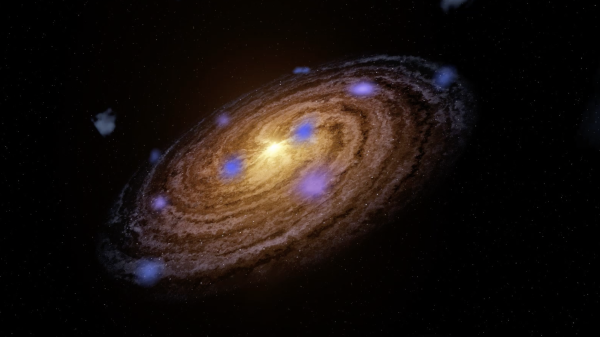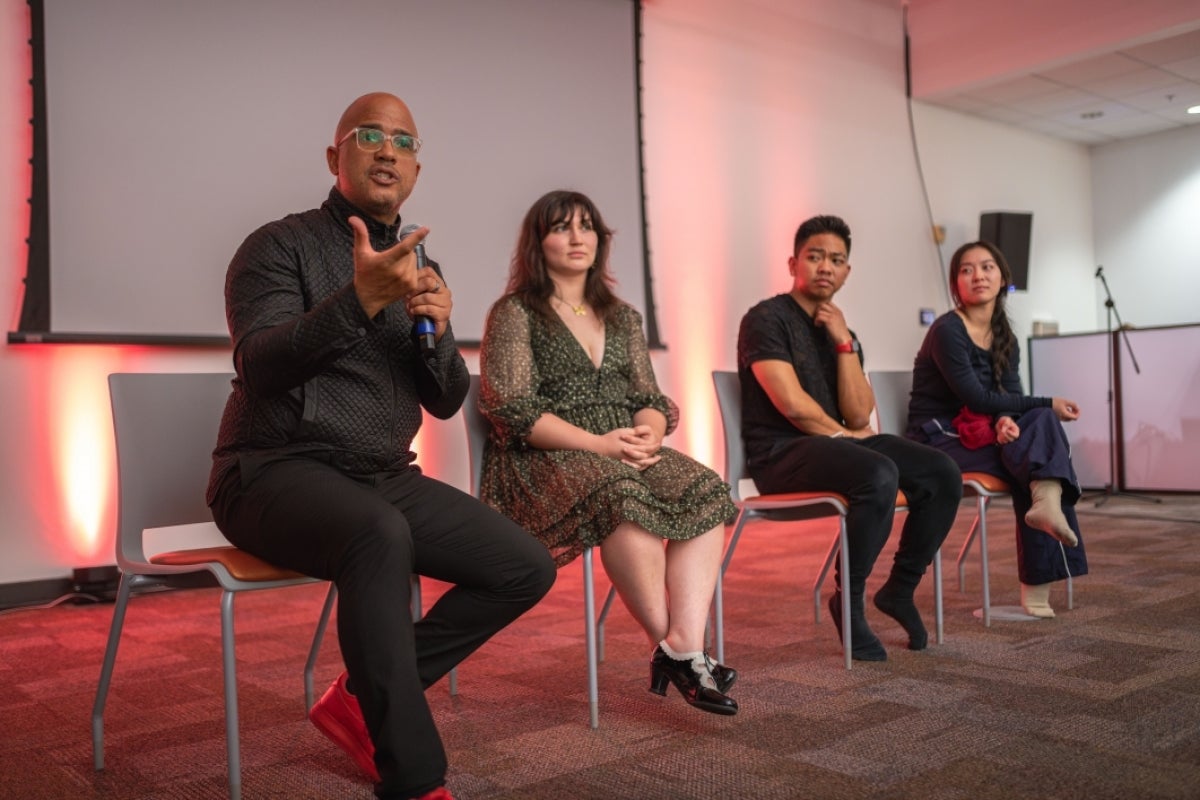ASU students explore digital trust through spoken word, song and dance

ASU student Valkyrie Yao during a performance she choreographed to showcase the digital fatigue that is often associated with the constant use of our devices. Photo by Mike Sanchez/ASU
"Because there is nothing more Human than hoping and dreaming/ Technology is created through our hopes and dreams/ it is an extension of who we are as people/ and how far we want to go forward/ we build artificial machines as intricate as our bodies/"
These words, excerpted from an original piece titled "Human Machines" (see below for the full transcript), reflect the thoughts of Herberger Institute for Design and the Arts (HIDA) student John Paul "JP" Alejandro on the concept of digital trust — the confidence that individuals have in the security, privacy and reliability of online interactions.
Alejandro performed the piece Monday, Oct. 16, as part of Arizona State University's 2023 Digital Trust Summit, the third annual convening to explore digital trust in the accelerating age of artificial intelligence.
“Every October, we host the Digital Trust Summit as part of our monthlong campaign campaign to recognize Cybersecurity Awareness Month at ASU,” said Donna Kidwell, summit host and ASU’s chief information security and digital trust officer. “We are thrilled to be able to showcase the immense talent of our ASU students and work with teams (like the Herberger Institute) to deeply humanize the concept of digital trust.”
Alejandro and fellow ASU students and performers Addison Hill and Valkyrie Yao, all of whom study under Associate Professor Daniel Bernard Roumain as a part of his DBR LAB, were invited to interpret the topic of trust and technology in both their personal and artistic pursuits.
Each performance focused on a different aspect of the convergence of trust around topics of artificial intelligence, technology, language and culture. Performances included:
- "One Hallelujah" by Daniel Bernard Roumain.
- "Unravel" by Addison Hill; see Hill’s living professional portrait.
- "Be Seen" by Valkyrie Yao.
- "Human Machines" by John Paul "JP" Alejandro.
The summit continued on Tuesday, Oct. 17, with a full-day event that included a speaker series and innovation experience at ASU Drone Studio.
"Human Machines"
By John Paul "JP" Alejandro
"Our bodies were designed to be like a machine/ cogs and gears that grind to produce ideas/ an innovation in this world/ Humans were the first to fabricate/ setting foot to mankind's greatest achievements/ like landing on the moon/ deep into the black abyss of space/ a seemingly impossible frontier/ our limbs move in confidence through lifeless gravity/ Wrought up from the inventions that we built to accompany us/ Because there is nothing more Human than hoping and dreaming/ Technology is created through our hopes and dreams/ it is an extension of who we are as people/ and how far we want to go forward/ we build artificial machines as intricate as our bodies/ to conquer the mundaneness of life/ to define life in our existence/ by finding the rewards in solving the unknown/ Despite our ingenuity,/ we have come to acknowledge/ the limits of our of existence:/ Climate Change/ Disease/ Overpopulation/ and again,/ we stand at the frontier of impossible obstacles/ as Human as we are/ we imagine a better world for everyone/ like the first time we thought to use flint to create fire/ we use our hands to spark the fire in our will/ so we create machines that reflect the expansiveness of the human mind/ this artificial intelligence/ processes information faster/ against the ticking down of the clock/ to help us focus on being more human than ever/ to dream bigger things to advance our people forward/ and hoping for a change that can secure a place in the future/ I put trust in knowing that nothing can replace us/ for as long as we stay at the front of our consciousness/ our machines built from our humanity/ can build the foundations of excellence for human kind."
More Science and technology

Cosmic clues: Metal-poor regions unveil potential method for galaxy growth
For decades, astronomers have analyzed data from space and ground telescopes to learn more about galaxies in the universe.…

Indigenous geneticists build unprecedented research community at ASU
When Krystal Tsosie (Diné) was an undergraduate at Arizona State University, there were no Indigenous faculty she could look to…

Pioneering professor of cultural evolution pens essays for leading academic journals
When Robert Boyd wrote his 1985 book “Culture and the Evolutionary Process,” cultural evolution was not considered a true…




